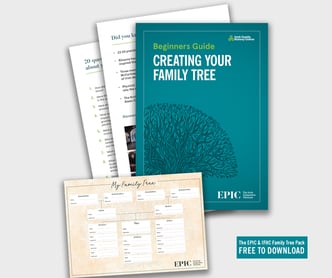Resources to help you with your genealogy research
There are so many archives and databases available to you that can help you unearth new discoveries in your Irish family history. Here we outline some of the best, and got our colleagues to write about what services they provide and how they can help you.
1. National Library of Ireland
"There's a wealth of information available here", writes Honora Faul, Assistant Keeper at the NLI. Every year thousands of people visit the National Library of Ireland (NLI) to carry out family research. The NLI’s free Genealogy Advisory Service is an ideal starting point for those beginning family history research as well as more experienced researchers.
A wealth of information is available that can be used to trace the history of a family, including ‘Catholic Parish Registers at the NLI’, a web-repository of parish records, property records, newspapers, directories and heraldic records.
The NLI also provides free on-site access to a number of subscription websites such as Findmypast, Ancestry, Irish Ancestors, and online newspaper resources The Irish Times and the Irish Newspaper Archive.
In addition to Roman Catholic parish registers, records of landed estates, newspapers and directories, the NLI holds a wealth of other information that can be used to trace the history of a family. This includes published family histories, photographs, and manuscript letters and diaries. Local history society publications often contain useful information on local sources such as gravestone inscriptions.
The Library regularly offers talks and workshops on family history research, as part of its ongoing events programme.
For the past number of years, the programme on genealogy organised by the Irish Family History Centre (Eneclann Ltd.) and Ancestor Network. Further information on talks and events in the National Library is available on the Library’s website, www.nli.ie or by joining the mailing list at mailinglist@nli.ie.
The NLI’s Genealogy Advisory Service is open, Monday-Friday, from 9.30am to 4.45pm. No appointment is necessary. For those who cannot visit in person, the Library offers an enquiry service; email: genealogy@nli.ie or telephone +353 1 6030 256. Find out more about family history research at the National Library in the family history section of the Library’s website.
2. National Archives
"The resources at the National Archives are available to all", writes Ton Quinlan, Keeper at the National Archives.
OCCUPYING a key position in the cultural and intellectual life of the nation, the National Archives preserves and provides access to archives rich in information relating to Ireland’s history and people.
As the State institution legally mandated to preserve the official records of central government in Ireland, the holdings of the National Archives document the State’s historical evolution and the
creation of a national identity. The National Archives also preserves archives of private individuals,
institutions, and organisations where these are of national significance and complement official archives.
The archives hold documents relating to all parts of Ireland and provide essential primary source material for people seeking to understand the political, economic and social forces that have shaped
our nation.
The archives also enable individuals to engage in the more personal exploration of their
own origins through research of their family history.
Including 19th-century tithe and land valuation records; fragments of official 19th-century census and
the complete censuses of 1901 and 1911; as well as wills and other testamentary records, largely ranging in date from the mid-19th century onwards, the archives constitute a treasure trove for those undertaking research into the history of their family.
In addition to these general sources of information, those researching an ancestor with a particular occupation, such as national school teachers, members of the Royal Irish Constabulary and resident magistrates, may find much of relevance.
Those with an ancestor who fell foul of the law will also not be disappointed, with police and court
records allowing the diligent family historian to research and gain an insight into the circumstances
surrounding conviction. Prison registers, prisoner case files and convict petitions, ranging in date from the late 18th century to the early 20th, permit further investigation of subsequent treatment in prison.
In recent years, in response to the growing interest in family history, the National Archives has made genealogical resources available free of charge online at www.genealogy.nationalarchives.ie/ and has recently published a genealogy toolkit for secondary schools that can be accessed online at
https://www.irishgenealogy.ie/en/2016-family-history/welcome.
For those who wish to visit the National Archives Reading Room on Bishop Street in person, a free
Genealogy Advisory Service is available onsite. The National Archives is open to the public from 9.15am-5pm, Monday to Friday — with the exception of public holidays. Intending visitors are recommended to look at their website at http://www.nationalarchives.ie/services/introduction/ or follow them on @NARIreland.
 Want to learn more about how you can start researching your family history? Click here to read the Irish Family History Centre's 12 tops tips and advice on how to begin exploring your Irish ancestry.
Want to learn more about how you can start researching your family history? Click here to read the Irish Family History Centre's 12 tops tips and advice on how to begin exploring your Irish ancestry.
3. The Irish Family History Centre
"We are family at the Irish Family History Centre", writes Fiona O'Mahony, Head of the IFHC.
RESEARCHING your family’s origins is a very personal journey and one that generally requires some assistance to get started and to keep moving in the right direction. Visitors arriving at the Irish Family History Centre have varying degrees of knowledge, from those who hope our experts can help them to drill through a brick wall, to absolute beginners who know only that a great-grandparent came from Ireland.
The headline of this article comes from a TripAdvisor review and gives a flavour of the level of customer service and assistance we strive to consistently achieve.
We welcomed our first visitor on May 7, 2016. Our experience has been extremely rewarding, at times emotional, as we support visitors with their research. In our experience, visitors need our occasional help, interpreting the evidence, confirming a connection, or providing context.
It’s their family history, and they want to enjoy the full experience and thrill of a successful search. Recently a lady was thrilled to discover and share with us that she had been married in the same church as her great-grandparents.
Visitors can begin their exploration using the touchscreen displays and information panels. Discover the number of Ryan households in 1890 in any given parish in Tipperary; Murphys in Wexford; or
Finnegans in Co Louth. Or that contrary to received wisdom, all Irish historical records were not destroyed, and much evidence survives to unlock your family history.
The next step is to use the computer workstations and start research with the collection of records on Find My Past. Start with what you know, and work backwards into the past. If you come prepared,
your granny’s name and date of birth, say, you will have enough evidence to start your investigation.
We have a team of family history and genealogy experts on duty seven days a week. They include some of the the best qualified ‘genies’ in Ireland, as everyone is university-accredited in Irish history and/or family history. Our researchers share visitors’ feelings of happiness and satisfaction in a successful search.
Every visitor to the centre is given a free month’s subscription to Find My Past — the World collection, and to the new IFHC website, on www.irishfamilyhistorycentre.com. We can give visitors the advice
and tools to continue their journey of discovery.
The Irish Family History Centre is an exciting new venture. In our first year we’ve had visitors from Ireland, the US, Canada, and the UK; and also from Australia, South Africa, Argentina and even the Bahamas who want to discover their ancestry.
Over the centuries the Irish dispersed across the globe. As their descendants look to find their roots it is important that they have a starting point where a helping hand, and a smile, is on hand.
4. Public Record Office of Northern Ireland
"The PRONI take on a titanic volume of work", writes Stephen Scarth.
THE Public Record Office of Northern Ireland (PRONI) is the official repository
for public records in Northern Ireland. It is empowered to take records created by Government
Departments, local councils, non-Departmental public bodies and accept privately-deposited
archives.
This wide remit has resulted in PRONI developing into a one-stop shop for archives in
Northern Ireland. Visitors can consult church records, Board of Guardian indoor relief registers, school registers, big estate collections, testamentary papers and archives relating to political parties at the same location.
Since 2016, PRONI became a division within the newly-created Department for Communities which is responsible for PRONI as well as libraries, museums, arts, culture, built heritage, the voluntary sector, Irish language and Ulster Scots.
This provides PRONI with the opportunity for partnership development, and strong relationships have already been forged with, amongst others, National Museums of Northern Ireland, Libraries NI, Linen Hall Library, Foras Na Gaeilge and the Ulster Scots Agency.
PRONI moved into its current premises in the Titanic Quarter area of Belfast in 2011. The landmark building can host major events, exhibitions and conferences in addition to state-of-the-art research areas.
Access is free but visitors need to produce proof of identity, such as a passport or driving licence. PRONI welcomes approximately 20,000 visitors per year, a quarter from out of state, a significant rise from the c15,000 it used to attract at its previous home. Due to legislation and technological advances, PRONI has had to adapt its services. Under the Freedom of Information Act 2000, any user can request access to closed records and government must release such information unless they cite a relevant exemption.
The UK government has also moved from closing records for 30 years to a 20-year rule, so PRONI is processing two years of released records each year. PRONI now permits users to copy many records using their own cameras, phones and tablets, or pay for digitised copies.
The PRONI website (www.nidirect.gov.uk/proni) was incorporated into the overarching NI Direct website in 2016. Key collections have been digitised and are accessible online, including a historical map viewer for six-inch Ordnance Survey maps. These date from 1832-1969 and are rich in detail, identifying individual houses.
PRONI’s Valuation Revision books are also available from 1864-1933 and allow researchers to identify land occupants for farms and properties across Northern Ireland. A wills index gives details of probated wills from 1858 onwards.
PRONI also makes available digitised copies of its 19th-century street indexes, an untapped treasure trove of information. The e-catalogue — which contains over 1.5 million entries — is also available online for searching and browsing. Future releases will include National Education Grant Applications 1832-89, which is useful as it contains details of payments for teachers. In 2017 PRONI also introduced a new online payments facility.
 Get our free Family Tree Pack!
Get our free Family Tree Pack!
EPIC & the Irish Family History Centre have created a beginners guide to help you take the first steps on your genealogy journey.
To find out more and to sign up to receive the pack, click below.

